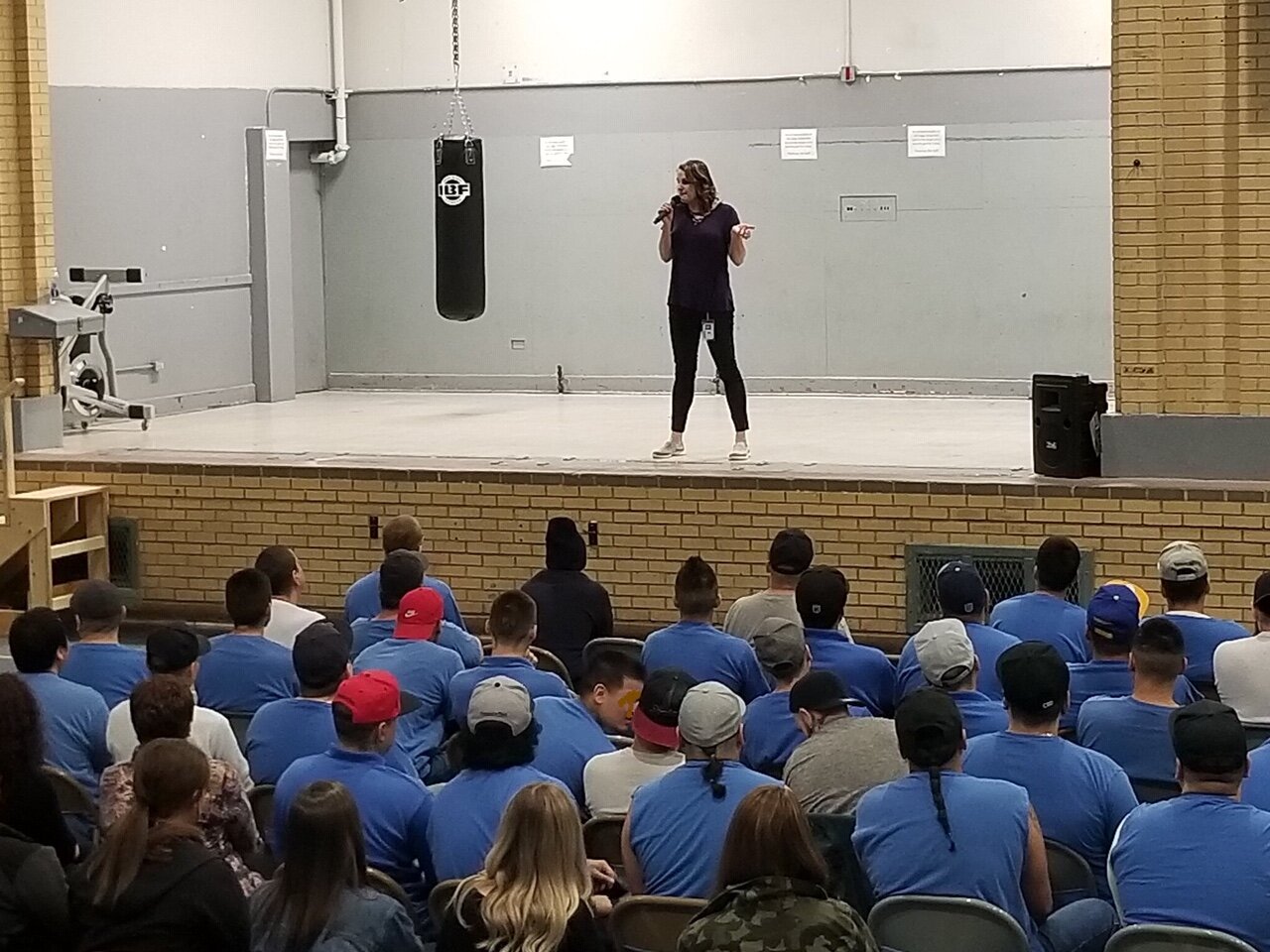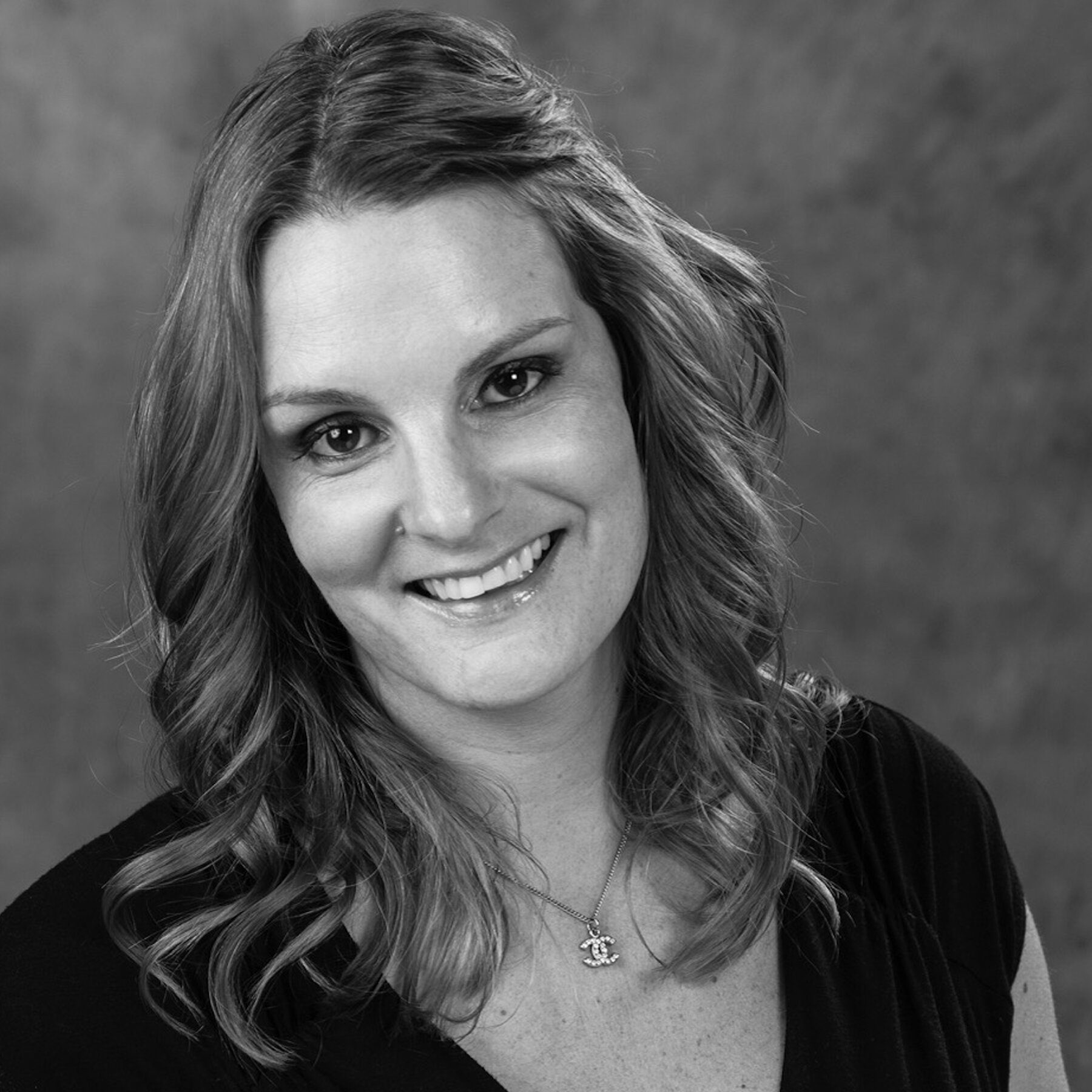Laughing on the Inside... by Carrie Cameron
One of my earliest memories is of my parents packing boxes in Petawawa Ontario for our move to Germany. We lived on the Canadian Army Base in Germany for six years and the only English speaking TV channel we got was CBC, and we loved it! I was raised on Hockey Night in Canada, stand-up comedy and bratwurst. I don’t recall a time in my life without stand-up comedy.
I think I must have started performing stand-up at the most inopportune time in my life. I had just suffered my first (but not last) miscarriage and decided the best way to deal with the loss was to check things off my bucket list. The first thing was skydiving. It DID NOT cure my fear of heights. Then I went on a road trip through the southern states, which was one of the best trips of my life. Finally, I wanted to try stand-up comedy.
My first time on stage was in 2008 at Rumor’s Comedy Club in Winnipeg. I did well enough for a first-timer. Ross Rumberg approached me after the show and asked if it was the first time I had done stand-up. After I answered yes, he said “Really? You were good” and he encouraged me to continue. That was it, I was hooked. Performing stand-up comedy became my new passion.
My comedy “career” is on the slooooow track. After I became hooked, I was told about local weekly open mics around Winnipeg. Before long I performed open mics around Winnipeg here and there whenever I felt like I had enough energy to walk up onto that stage and try to make people laugh. I’m not sure what was more difficult, trying to start a family (but repeatedly failing) or waking up early every morning to drive up the winding road to the big castle on the hill. It was years before I told my comedy peeps that I worked at Stony Mountain Institution, a federal prison just North of Winnipeg. I just didn’t have the energy for the Q & A’s that usually come after people find out you work in prison (“with MEN?” Yes, with men). I wanted to separate myself from work and concentrate on comedy.
It is difficult to work with violent criminals day in and day out. I disliked the sound of barriers slam and lock behind me each day. As a Correctional Officer I didn't like working midnights and seeing inmates masturbate each time I did a range walk (you masturbate every half-hour on the half hour? Do you have high T? Because that could lead to heart disease. And apparently if you do that too much you’ll go blind-BLIND!!! Like I wish I was right now after seeing that bullshit EVERY HALF HOUR ON THE HALF HOUR). As a Parole Officer, notifications were the worst. Having to tell a guy on your caseload that they lost a loved one was no easy task. I can’t imagine how difficult it would be for a doctor or police officer to have to routinely perform the duty of breaking someone’s heart. When I facilitated rehabilitation programs, I really loved my job but having a trauma based career takes a toll. I can’t count how many inmates have had to tell me, in great detail, about how and why they murdered (and/or raped, pillaged & plundered). Some cases immediately hit me hard, while the accumulation of other cases took longer to get to me, but in either case, I was changed.
Working for the Correctional Service of Canada is very rewarding work, but it’s really difficult. I didn’t think so at first, but when I look back on all the shit that happened over the two decades I spent behind bars (8 hours at a time) I wonder how I survived it at all. Plus I was trying to sprinkle writing and performing stand-up comedy into the mix. It was very difficult, but comedy is my passion, so I stuck to it(ish). I performed around Winnipeg infrequently, but I did what I could, when I could and little by little I improved.
My health improved too and after several losses we had two beautiful children (not ugly ones). Trying to balance a career and a marriage while raising two young children left me little time to sleep, never mind trying to write and perform comedy.
In comedy when it comes to stage time, less is not more-it’s less; but I kept going, albeit very sporadically. My writing continued to be stronger than my performances. But I tried to heed the advice of my more experienced comedy peers and develop stage comfort. To be honest, I had much more confidence and comfort in prison than on stage.
When the Warden of Stony Mountain Institution showed an interest in my comedy, I proposed a show at the prison. The Warden was immediately interested and excited over the prospect of the show, but stipulated it had to be cost neutral. Fundraising efforts were successful and in February of 2016 the first “Laughing on the Inside” comedy showcase was performed for an eager audience. The show was a resounding success and has since been held annually in the inmate gym. The show is intended to bring laughter, unity and hope to a place known for the opposite of those things. Although performers are working with a tough crowd, the audience is a captive one. In 2017 the Winnipeg Comedy Fest began helping with the event and the show has grown and improved over the years. This year, with support of the Winnipeg Comedy Fest, the Laughing on the Inside show will celebrate it’s 5th anniversary. As far as comedy goes, the Laughing on the Inside show is my crowning achievement. Now that I live in Alberta, I travel to Stony Mountain each year to host the show and keep it going.
Stony Mountain Institution’s LOI3: top left-SMI’s Deputy Warden, the late great John B. Duff & SMI’s Warden. Bottom: Rob Bebenek, Carrie Cameron & Carol Zoccoli
After my move to Alberta, my stage comfort grew. I advanced in competitions (and even won one), began booking spots here and there, did a corporate and hosted several shows. As my comedy confidence grew, my confidence at work diminished. I agreed to begin working with the sex offender population in order to secure my transfer to Alberta. Working with sex offenders played a significant part in my undoing. Even though the inmates were easy to work with and seemingly eager to change, I couldn’t help picturing my own children as victims. I had a hard time “leaving it at work” and felt sad most of the time. I became depressed, began to isolate myself and had trouble sleeping. I went on stage a few times in the middle of all this, but when I went off script I rambled on about unfunny things. I knew I was in trouble. I was hanging on by a thread, and that thread was unraveling. I decided to honor my comedy commitments and my work commitments, then take time to care for myself. I wanted to schedule my breakdown for a more convenient time-I soon learned it doesn’t work that way.
One of my comedy commitments was a contest in Edmonton. When I signed up for the competition, I was excited. When I went to the competition, I was lost (literally and figuratively). I left work in Innisfail and raced up hwy #2 to Edmonton but despite my attempts, I was 10 minutes late for call time. I missed the briefing, didn’t know where the timing light was or where the judges were seated, and was panicked the entire time. On stage I got a few good laughs and that felt good; that feeling was short lived. After the show, as the crowd began thinning out, I walked past a table full of people and from behind me heard someone say “sore loser” followed by laughter from others at the table. I looked back to see that the man who was taunting me was one of the judges. That felt awful. He was right though, I was sore, but it had nothing to do with the competition (also, I’m a loser-misplacing things on the regular, so he was right on both counts).
I was becoming unraveled; comedy had always been my reprieve, my happy place, but that too was souring. I knew I had to stop performing comedy for a while because I didn’t want to sabotage my progress or be misperceived. A few weeks later (after a bunch of stuff happened at work) I was listening to inmates talk about their childhood traumas and the traumas they inflicted on others, and I thought “I can’t do this anymore”. After the inmates left the classroom, I said “I can’t do this anymore”. Hearing myself say it aloud convinced me to take a step back and leave work for a while. Before I left, as I tied up loose ends, my single recurring thought was “I can’t do this anymore.” I heard it on repeat, louder and louder each time “I CAN'T DO THIS ANYMORE!!” I left work that sunny spring afternoon and stepped into the great unknown.
Since I was a little army brat in Germany I have been in love with the art of comedy. As a teenager I told others I wanted to be a comedian. As a young adult I told myself my artistic pursuits were hobbies; I needed a stable career, a steady paycheck and a pension. I was too scared to pursue comedy as a career. I applaud those of you who went for it, I was not that brave.
For the first time ever, my future is uncertain-but one thing is certain: I will continue to work on improving my comedy. I want nothing more than to continue helping people through my work. With more time and effort (ten thousand hours), I hope to have a career behind the mic instead of behind bars (unless it’s for a comedy show).





